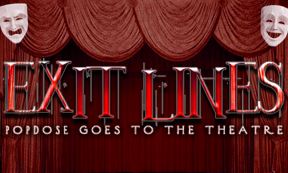 The winter of our discontent? Not on New York stages, anyway. Dear Evan Hansen, an Off Broadway hit last season, has been warmly received on the Main Stem, and gives its composers, the lyricists of La La Land, holiday cheer across two mediums. The latest play-to-movie-to-musical, A Bronx Tale, received Bronx cheers from the critics, but solid grosses may help it pick up where the departing Jersey Boys will soon leave off. They can’t all be successes–Diane Lane suffered nobly through a misbegotten production of The Cherry Orchard, the design of which suggested that mobiles are best left to Alexander Calder and baby cribs. (I’m still recovering from its party scene, with the actors masked, but not enough to conceal their identities.) I can’t say it’s been a terribly exciting season to date, but it hasn’t been a bad one, and the second act shows promise.
The winter of our discontent? Not on New York stages, anyway. Dear Evan Hansen, an Off Broadway hit last season, has been warmly received on the Main Stem, and gives its composers, the lyricists of La La Land, holiday cheer across two mediums. The latest play-to-movie-to-musical, A Bronx Tale, received Bronx cheers from the critics, but solid grosses may help it pick up where the departing Jersey Boys will soon leave off. They can’t all be successes–Diane Lane suffered nobly through a misbegotten production of The Cherry Orchard, the design of which suggested that mobiles are best left to Alexander Calder and baby cribs. (I’m still recovering from its party scene, with the actors masked, but not enough to conceal their identities.) I can’t say it’s been a terribly exciting season to date, but it hasn’t been a bad one, and the second act shows promise.
Nathan Lane is always good copy, and he’s in rare form in a revival of The Front Page–when he shows up, that is. Ben Hecht and Charles MacArthur’s classic newsroom farce obliges him to bark occasional orders over the phone for the better part of two of its three acts, then brings him on for a blitzkrieg of laughs, many embedded, some not. (The night I saw him, he was trying to make the word “pulleys” funny. It almost worked.) The anticipation over his arrival isn’t killing, however, not when you have an enormous cast of this caliber sharing the Broadhurst stage with him. How big? So big that the stalwart Dylan Baker, Christopher McDonald, and Dann Florek get second banana billing, behind Lane, Mad Men John Slattery and Robert Morse, John Goodman, Holland Taylor, and Broadway troupers Sherie Rene Scott and Jefferson Mays. I’m sure there were no hard feelings, as they’re all having fun up there on Douglas W. Schmidt’s Chicago press room set, a creaky marvel roaring with raffish Twenties ambiance, and invite us to share in it. Howard Hawks may have perfected the material by adding an ingenious sex change to his film His Girl Friday (1940), but the 88-year-old original, though abridged for present sensibilities (the word “colored” an obvious substitution), retains a hard-edged fascination under director Jack O’Brien’s rattling pace.
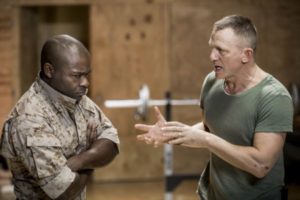 Set design is part of the appeal of two Off Broadway sellouts, Othello and The Wolves. The immediate appeal of the Shakespeare is, of course, its two stars, Daniel Craig, as a wicked, and wickedly funny, Iago, and the desperately noble Othello of David Oyelowo, brought low by the “green-eyed monster.” But scenic designer Andrew Lieberman has encased the whole of the New York Theatre Workshop, bleacher seats included, in plywood, for a military barracks atmosphere appropriate for this modern warfare interpretation. It’s like spending more than three hours in a shipping container, and not a large one, as Jane Cox’s daringly sparse lighting (down to phone screens at certain points, including the first section of the play) reinforces claustrophobia–and also sharpens our focus on the play, which isn’t performed as much as the Bard’s other “greatest hits” here in New York. (The last one I saw was 15 years ago, with Liev Schreiber and Keith David.) Some of Sam Gold’s other militia-minded directorial choices are less successful (I did like the cast singing Drake’s “Hotline Bling”) and while Finn Witrock is a notable Cassio not everyone is up to the caliber of the leads, like Rachel Brosnahan’s strident Desdemona and Matthew Maher’s oddball Roderigo. Still, with the emphasis on text you feel the weight of each death as Iago wreaks his havoc, and Craig, uncomfortable the last two times I saw him onstage, is firmly in his element. A Broadway transfer has been mooted, though even in the smallest house it wouldn’t have the same compressed impact.
Set design is part of the appeal of two Off Broadway sellouts, Othello and The Wolves. The immediate appeal of the Shakespeare is, of course, its two stars, Daniel Craig, as a wicked, and wickedly funny, Iago, and the desperately noble Othello of David Oyelowo, brought low by the “green-eyed monster.” But scenic designer Andrew Lieberman has encased the whole of the New York Theatre Workshop, bleacher seats included, in plywood, for a military barracks atmosphere appropriate for this modern warfare interpretation. It’s like spending more than three hours in a shipping container, and not a large one, as Jane Cox’s daringly sparse lighting (down to phone screens at certain points, including the first section of the play) reinforces claustrophobia–and also sharpens our focus on the play, which isn’t performed as much as the Bard’s other “greatest hits” here in New York. (The last one I saw was 15 years ago, with Liev Schreiber and Keith David.) Some of Sam Gold’s other militia-minded directorial choices are less successful (I did like the cast singing Drake’s “Hotline Bling”) and while Finn Witrock is a notable Cassio not everyone is up to the caliber of the leads, like Rachel Brosnahan’s strident Desdemona and Matthew Maher’s oddball Roderigo. Still, with the emphasis on text you feel the weight of each death as Iago wreaks his havoc, and Craig, uncomfortable the last two times I saw him onstage, is firmly in his element. A Broadway transfer has been mooted, though even in the smallest house it wouldn’t have the same compressed impact.
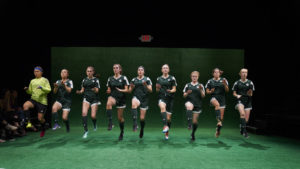 Prestige magnate Scott Rudin is involved with The Wolves, a Playwrights Realm production that I missed in its original run, but caught upon its return to the Duke on 42nd Street. So it should have an afterlife, though again the scenic design, by Laura Jellinek, is integral to the effect. Like Othello this is a pressure cooker. For 90 minutes we observe a girls soccer team over the course of a season, one with a lot of airheaded chit-chat (Cambodia’s tortured history is evoked, in girl speak delivered in overlapping, Robert Altman-esque bursts) and hurtful innuendo about sex, boyfriends, and weight–all suddenly dispersed by tragedy. Playwright Sarah DeLappe and director Lila Neugebauer place us right on the sidelines with the team (all identified by jersey number), who warm up and practice throughout–I assume this is what a drew an audience of soccer moms and their daughters to the matinee I attended. They were in for a shock, as the air quickly turned blue with teenage trash talk, and faces turned red. But it’s the sort of show that disturbs the peace in order to clear the air, and I wish I could have eavesdropped on the conversations afterwards. Written, performed, and staged by women, The Wolves doesn’t talk down to audiences, and is one of the highlights of the season.
Prestige magnate Scott Rudin is involved with The Wolves, a Playwrights Realm production that I missed in its original run, but caught upon its return to the Duke on 42nd Street. So it should have an afterlife, though again the scenic design, by Laura Jellinek, is integral to the effect. Like Othello this is a pressure cooker. For 90 minutes we observe a girls soccer team over the course of a season, one with a lot of airheaded chit-chat (Cambodia’s tortured history is evoked, in girl speak delivered in overlapping, Robert Altman-esque bursts) and hurtful innuendo about sex, boyfriends, and weight–all suddenly dispersed by tragedy. Playwright Sarah DeLappe and director Lila Neugebauer place us right on the sidelines with the team (all identified by jersey number), who warm up and practice throughout–I assume this is what a drew an audience of soccer moms and their daughters to the matinee I attended. They were in for a shock, as the air quickly turned blue with teenage trash talk, and faces turned red. But it’s the sort of show that disturbs the peace in order to clear the air, and I wish I could have eavesdropped on the conversations afterwards. Written, performed, and staged by women, The Wolves doesn’t talk down to audiences, and is one of the highlights of the season.
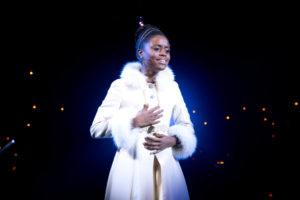 Set-wise, I drew the short end of the samovar with the Broadway staging of the Off Broadway hit Natasha, Pierre and the Great Comet of 1812, for which the Imperial has been transformed, breathtakingly, into a simulacrum of Russia, circa Tolstoy’s War and Peace. (The musical’s an adaptation of a snippet from the novel–and only in War and Peace can you call 70 pages a “snippet.”) Off Broadway viewers got a meal with the entertainment; I was thrown a boxed pierogi, to make amends I assume for an orchestra seat that was still situated below much of the action, requiring constant craning of my neck to see much. I didn’t see anything of Broadway first timer Josh Groban, who was out the night I went, but I’m not sure that mattered. His excellent standby, Scott Stangland, has been with the show since its humble origins, and Pierre’s travails are subordinate to the tangled tale of Natasha, a luminous debut by Denee Benton. (So complicated that Dave Malloy’s book and lyrics, ranging from doggerel to some sweeping ballads, humorously backtracks to explain itself from time to time.) The gifted director, Rachel Chavkin (Hadestown), keeps the production from overspilling, and the ballroom sequence that closes the first act is thrilling. Afterwards, in the spirit of revolution (and as seeming compensation for my troubles), I did stand with the crowd outside Hamilton next door, who were protesting Mike Pence following that now tweet-famous performance.
Set-wise, I drew the short end of the samovar with the Broadway staging of the Off Broadway hit Natasha, Pierre and the Great Comet of 1812, for which the Imperial has been transformed, breathtakingly, into a simulacrum of Russia, circa Tolstoy’s War and Peace. (The musical’s an adaptation of a snippet from the novel–and only in War and Peace can you call 70 pages a “snippet.”) Off Broadway viewers got a meal with the entertainment; I was thrown a boxed pierogi, to make amends I assume for an orchestra seat that was still situated below much of the action, requiring constant craning of my neck to see much. I didn’t see anything of Broadway first timer Josh Groban, who was out the night I went, but I’m not sure that mattered. His excellent standby, Scott Stangland, has been with the show since its humble origins, and Pierre’s travails are subordinate to the tangled tale of Natasha, a luminous debut by Denee Benton. (So complicated that Dave Malloy’s book and lyrics, ranging from doggerel to some sweeping ballads, humorously backtracks to explain itself from time to time.) The gifted director, Rachel Chavkin (Hadestown), keeps the production from overspilling, and the ballroom sequence that closes the first act is thrilling. Afterwards, in the spirit of revolution (and as seeming compensation for my troubles), I did stand with the crowd outside Hamilton next door, who were protesting Mike Pence following that now tweet-famous performance.
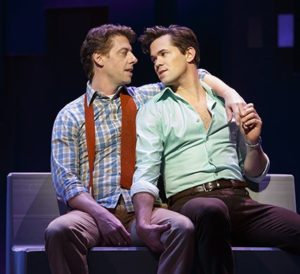 William Finn’s Falsettos, a revolutionary act in its day, is on Broadway for a 25th anniversary engagement. Finn’s two one-acts, which he joined into a single production, explore homosexual and family life as the age of AIDS dawns in New York City, and it’s depressing to realize how far we’ve come and how much we stand to lose in the coming sociopolitical turmoil. While quite poignant, the show is hardly a downer–a musical that begins with a number called “Four Jews in a Room Bitching” can hardly be that–even if the main character, who has left his wife and son for a younger man and shuttles between them, is impossibly self-centered. That problem is nearly solved by having the wonderful Christian Borle play him, and strong support comes from Andrew Rannells as the boyfriend, Stephanie J. Block as the wife (who has an anthem of her own, sung very tartly in the wake of the election), and Anthony Rosenthal as the son. (There are plenty of kids on Broadway, but few given such intense vocal demands in a show that’s sung through for the better part of three hours.) You can see for yourself what the fuss over Falsettos is all about when Live from Lincoln Center broadcasts it in the new year.
William Finn’s Falsettos, a revolutionary act in its day, is on Broadway for a 25th anniversary engagement. Finn’s two one-acts, which he joined into a single production, explore homosexual and family life as the age of AIDS dawns in New York City, and it’s depressing to realize how far we’ve come and how much we stand to lose in the coming sociopolitical turmoil. While quite poignant, the show is hardly a downer–a musical that begins with a number called “Four Jews in a Room Bitching” can hardly be that–even if the main character, who has left his wife and son for a younger man and shuttles between them, is impossibly self-centered. That problem is nearly solved by having the wonderful Christian Borle play him, and strong support comes from Andrew Rannells as the boyfriend, Stephanie J. Block as the wife (who has an anthem of her own, sung very tartly in the wake of the election), and Anthony Rosenthal as the son. (There are plenty of kids on Broadway, but few given such intense vocal demands in a show that’s sung through for the better part of three hours.) You can see for yourself what the fuss over Falsettos is all about when Live from Lincoln Center broadcasts it in the new year.
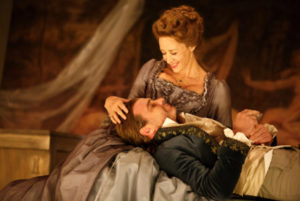 There’s not much to celebrate regarding Holiday Inn, a movie musical-into-stage musical right off the standard template. (I saw it before the holidays, so it’s likely at peak now.) The late Alan Rickman and Lindsay Duncan broke the mold with Les Liaisons Dangereuses 30 years ago; a subsequent revival a few years back, with Laura Linney and Ben Daniels, was a flop, and the latest one, with Liev Schreiber and Janet McTeer, is wan. If these two pros can’t get much going onstage, then I suspect the problem may be with the overly verbose source, which was neatly sharpened into the outstanding film Dangerous Liaisons. Character actor Simon McBurney, a familiar movie villain in the likes of Mission Impossible: Rogue Nation and Allied, is the whole show in his own play The Encounter, an oddball piece that’s piped into headphones, while the performer enacts the struggles of Amazonian explorers and his own domestic life. I’m not entirely sure what amounts to Bluetooth podcasting with a strenuous live component is the future of theatre–it certainly wasn’t for the woman seated next to me, who bolted after ten minutes. Maybe she’ll return to Broadway for the debut of Cate Blanchett in The Present, as Act Two of the season commences. I’ll be there.
There’s not much to celebrate regarding Holiday Inn, a movie musical-into-stage musical right off the standard template. (I saw it before the holidays, so it’s likely at peak now.) The late Alan Rickman and Lindsay Duncan broke the mold with Les Liaisons Dangereuses 30 years ago; a subsequent revival a few years back, with Laura Linney and Ben Daniels, was a flop, and the latest one, with Liev Schreiber and Janet McTeer, is wan. If these two pros can’t get much going onstage, then I suspect the problem may be with the overly verbose source, which was neatly sharpened into the outstanding film Dangerous Liaisons. Character actor Simon McBurney, a familiar movie villain in the likes of Mission Impossible: Rogue Nation and Allied, is the whole show in his own play The Encounter, an oddball piece that’s piped into headphones, while the performer enacts the struggles of Amazonian explorers and his own domestic life. I’m not entirely sure what amounts to Bluetooth podcasting with a strenuous live component is the future of theatre–it certainly wasn’t for the woman seated next to me, who bolted after ten minutes. Maybe she’ll return to Broadway for the debut of Cate Blanchett in The Present, as Act Two of the season commences. I’ll be there.





Comments